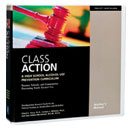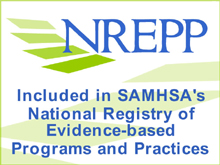| Alcohol is the drug of choice for American teenagers, and alcohol use during early adolescence increases the likelihood of progression to heavy alcohol use and to the use of other illicit drugs. The influence of peers, family members, school, the media, and the community have been shown to play a critical role in promoting or discouraging alcohol use among teens. That's why the prevention researchers who developed Project Northland focused on engaging not only youth but also schools, families, and the larger community in one comprehensive prevention effort.
Project Northland Grades 6-8 - Alcohol Use Prevention Curriculum
Used in SAMHSA's Reach Out Now Program
by Cheryl L. Perry, Ph.D., Kelli A. Komro, Ph.D., Carolyn L. Williams, Ph.D., Sara Veblen-Mortenson, M.S.W., M.P.H., and  Bonnie S. Dudovitz, M.Ed., Developed by the University of Minnesota Bonnie S. Dudovitz, M.Ed., Developed by the University of Minnesota
- Recognition - National Registry of Evidence-based Programs and Practices
- "A" Rating - Making the Grade by Drug Strategies
- Exemplary Programs - Office of Juvenile Justice and Delinquency Prevention, U.S. Department of Justice and Safe and Drug-Free Schools, U.S. Department of Education
- Meets Principle of Effectiveness #3 for Safe and Drug-Free School
Class Action: Grades 9-12 - A High School Alcohol Use Prevention Curriculum
by Cheryl L. Perry, Ph.D., Carolyn L. Williams, Ph.D., and Sara Veblen-Mortenson, M.S.W., M.P.H., Developed by the University of Minnesota 
This high-school component of Project Northland looks at the real-world social and legal consequences of underage alcohol use. Based on the social influences theory of behavior change, the goal of Class Action is to change the social norms around alcohol use and to change negative peer pressure into positive peer pressure. In eight to ten weekly sessions, teens are divided into six legal teams to prepare and present hypothetical civil cases in which someone has been harmed as a result of underage drinking. The six cases are Drinking and Driving on Trial, Fetal Alcohol Syndrome on Trial, Drinking and Violence on Trial, Date Rape on Trial, Drinking and Vandalism on Trial, and School Alcohol Policies on Trial.
About Project Northland
Project Northland is based on the most rigorous alcohol-use prevention trial ever funded by the National Institute on Alcohol Abuse and Alcoholism (NIAAA) and was developed in a region of the country that led the nation in alcohol-related teen traffic fatalities. The program was designed by prevention researchers to delay the age when youth begin drinking, to reduce use among young people who have tried alcohol, to limit the use of other drugs, and to reduce alcohol-related problems.
How it works
Project Northland employs grade-specific tasks, exercises, and activities in a variety of highly engaging, interactive formats--such as comic books and posters--to reach young people at an age when they are most likely to try alcohol. Because this program includes important community components, it can be effectively implemented by schools as well as by community programs.
Study outcomes
Project Northland is a CSAP-approved curriculum with proven outcomes. Overall, outcomes from an initial three-year test of the program show that, relative to the control group, students who participated in Project Northland demonstrated reduced levels of alcohol, marijuana, and cigarette use and displayed more resilient behaviors.
Students who participated in Project Northland:
- Showed reduced levels of alcohol use
- 30% lower weekly drinking
- 20% lower monthly drinking
- Engaged in significantly less cigarette and alcohol use over time
- 27% lower use of cigarettes by the end of eighth grade
- 27% lower use of alcohol by the end of eighth grade
- Demonstrated markedly lower drug use by eighth grade. Intervention group students who never drank alcohol at the beginning of sixth grade showed
- 50% lower marijuana use by the end of eighth grade
- 37% lower cigarette use by the end of eighth grade
|
 |
Project Northland Home Page
Contact Us
Components
Project Northland Complete
Project Northland Grades 6-8
Class Action: A High School Alcohol Use Prevention Curriculum Grades 9-12
Slick Tracy
Amazing Alternatives!
PowerLines Grade
Supercharged!
Scope & Sequence
Research Document
Request a Project Northland Grant Writing Toolkit
Spanish Resources
Training
|

